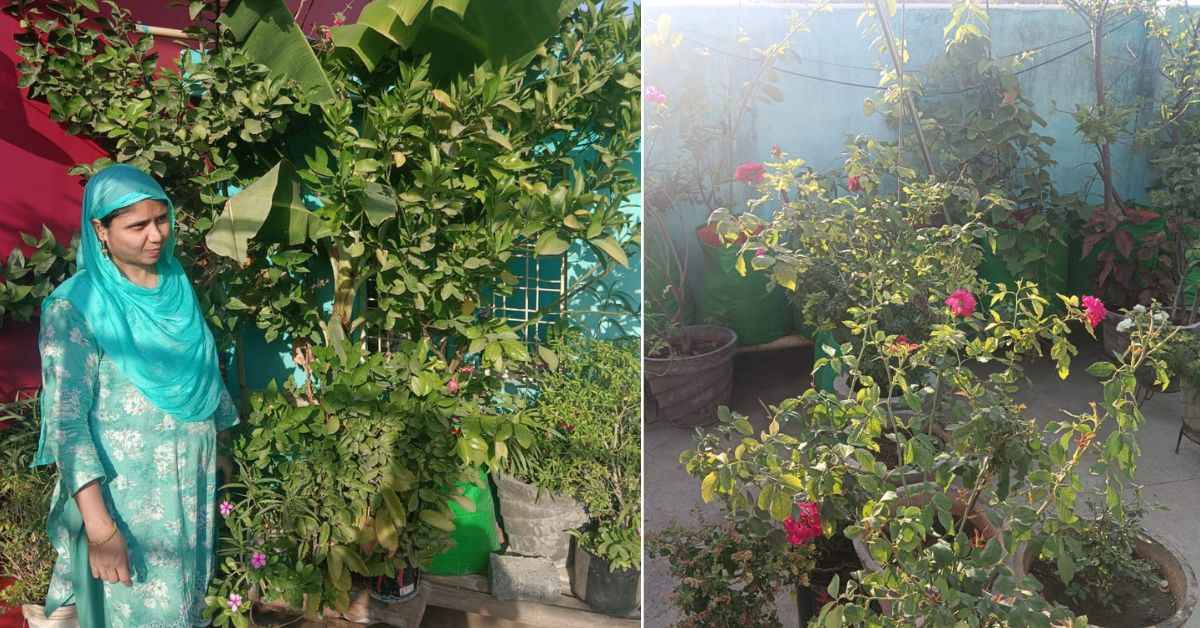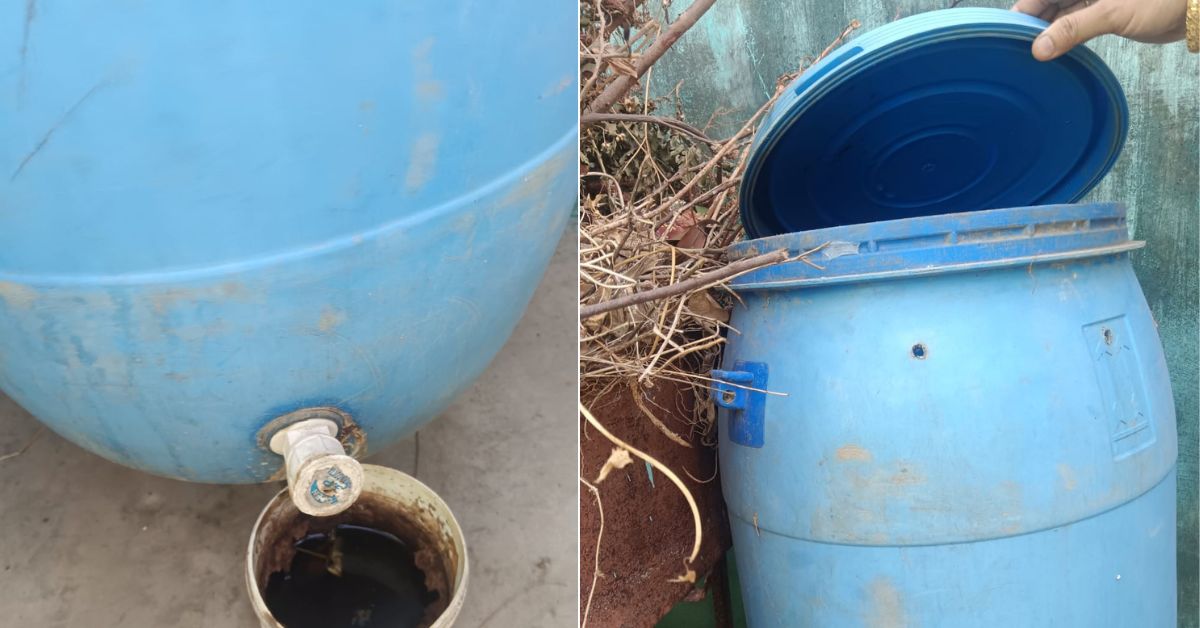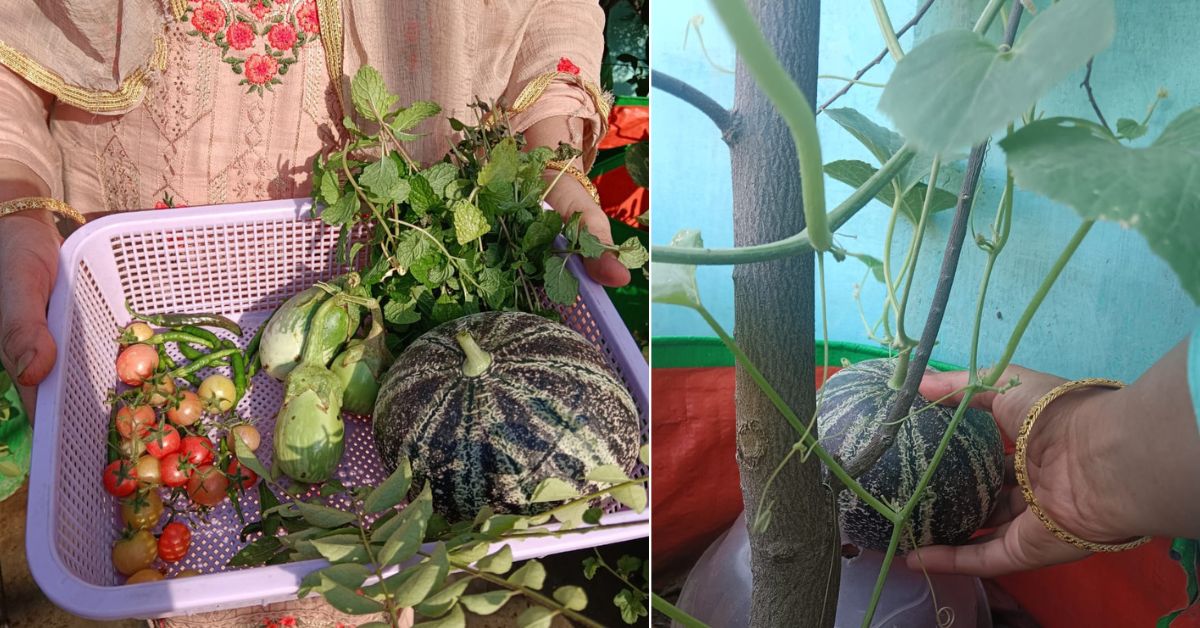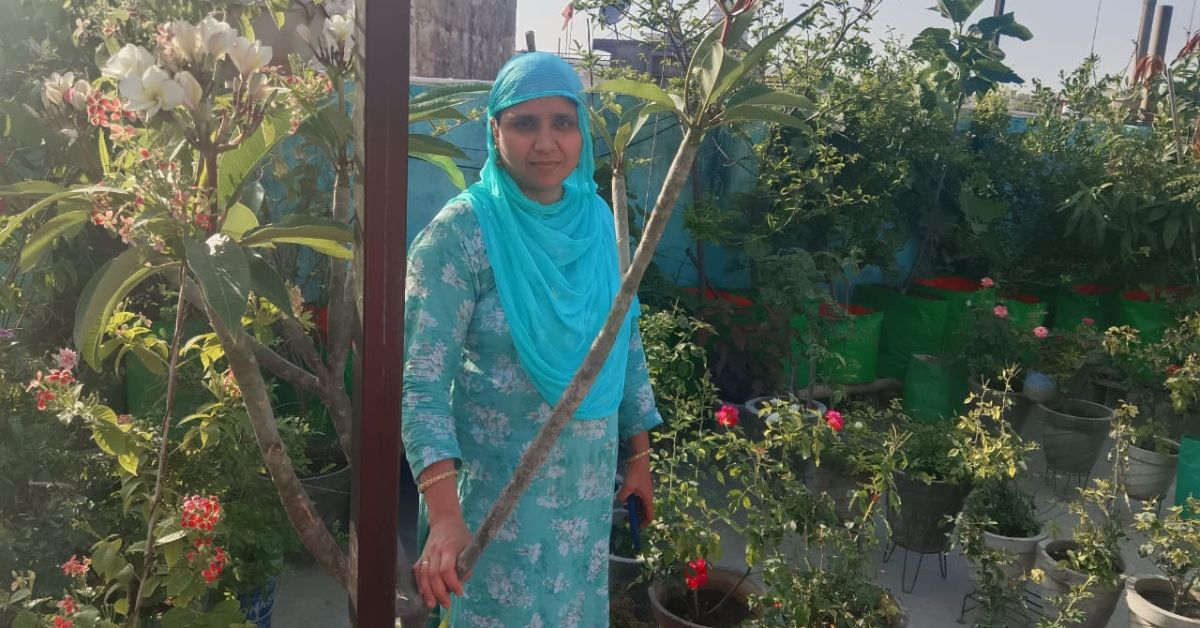47-YO Mother Grows Anjeer, Jamun & 200+ Trees in a Living Tribute to Her Late Daughter
Atop her modest home in Jhansi, Afsana Parveen has nurtured a blooming tribute to love and loss — a vibrant rooftop garden with over 200 plants of various flowers, fruits, and vegetables.
Her passion for gardening took root in her childhood, inspired by her father, whose hands were always tenderly raising life from soil and seed. It was in those early days that Afsana’s love for the green world blossomed, and later, when she and her husband Salim built their home, she finally made her dream of a terrace garden a reality.
With no space left downstairs, her daughter Kulsum Fatima suggested transforming the rooftop into a flourishing oasis. The vision was clear — a sanctuary brimming with flowering plants and the joyful chaos of leaves and blooms, reminiscent of the time they spent planting at her grandmother’s sprawling house.
But in 2021, a year etched in pain, Kulsum suddenly fell ill. What started as a simple stomach ache swiftly turned into a nightmare. The doctors worked tirelessly, but the illness of Appendicitis was aggressive and relentless. Afsana watched helplessly as her precious daughter slipped away, leaving behind dreams of a garden they would never plant together.
“She left all of us. She was just 17,” recalls Afsana after a brief pause.
The loss left a void that words could not fill. Yet, in her grief, Afsana found a purpose — a way to keep her daughter’s memory alive. She clung to that dream — to create a garden alive with colour and joy as a way to hold her daughter close, even in her absence.
 Each plant Afsana nurtured was a homage to her daughter — and that kept her going.
Each plant Afsana nurtured was a homage to her daughter — and that kept her going.
With tears in her eyes and soil-stained hands, she planted the first few saplings, whispering prayers for their growth. Neither the searing heat nor the encroaching night deterred her. She immersed herself in gardening.
“I would hurry through my household chores to go up to the terrace to nurture my plants, they were now as precious to me as the memory of my daughter. Some days, I would plant 10 saplings in a single stretch. I wanted to see her dreams realised,” she says.
For the past four years, she poured her heart and soul into creating a lush sanctuary, each plant a reflection of dreams cherished and promises kept.
Today, as friends and neighbours visit, drawn by the vibrant blooms and the hushed sanctuary Afsana has created, her heart swells with quiet triumph. “Guests come to my terrace and take selfies with my plants. I feel I have been able to succeed in fulfilling my daughter’s dream,” she smiles.
But behind this beauty lies a world of effort and experimentation, especially in how Afsana nurtures each plant with care.
Compost from peels, eggshells, tea leaves
The early days were a struggle. Afsana’s heart was heavy, and her knowledge of gardening limited. She faced many challenges, from losing plants in scorching summer days to temperamental varieties that refused to bloom. However, each plant she nurtured was a homage to her daughter — and that kept her going.
As days turned into weeks and weeks into months, Afsana’s terrace began to transform. The garden burgeoned with a variety of flowering plants like hibiscus and bougainvillaea, and fruit trees like anjeer (figs), guava, jamun, and shareefa (custard apple). Every corner of the 1,500-square-foot terrace was filled with life.
 Afsana prepares compost using fruit peels, boiled tea leaves, and eggshells, and garden waste.
Afsana prepares compost using fruit peels, boiled tea leaves, and eggshells, and garden waste.
Afsana embraced organic gardening wholeheartedly. She watched innumerable YouTube videos and read every book she could find on the subject. She became adept at creating her own compost, utilising kitchen waste, and inventively repurposing oil drums and paint buckets for plant containers.
Her garden thrived under her care, free from harsh chemicals. “I utilise a 50-litre drum for composting. Into this, I layer soil, kitchen scraps like fruit peels, boiled tea leaves, and eggshells, along with garden waste like leaves, and repeat the soil and waste layers, adding small amounts of water along the way,” she shares.
“Every two weeks, I rotate the contents. This process yields nutrient-rich water at the end, and it takes about six months to produce fully mature compost in the entire drum. For the liquid fertiliser, I dilute one litre with 10 litres of water before applying it to my plants,” she adds.
When preparing potting mix, Afsana blends cocopeat, vermicompost, neem khali (cake), and a pinch of turmeric powder (to ward off pests) in the pots.
Homegrown harvests meet the family’s needs
As the seasons passed, her garden yielded its first harvest. The vegetables she gathered — brinjals, bitter gourd, green chillies — tasted remarkably different from those bought from the market. They were fresh, tender, and delicious.
On the morning of our interview, she harvested brinjals, bitter gourd, and green chillies to make curry for the family. “When I first harvested torai (ridge gourd), my family couldn’t believe how tasty it was. Now, they delight in these once-overlooked vegetables. There’s a noticeable difference in the flavour of market-bought versus homegrown produce. My vegetables are soft and delicious, and they cook quickly. For example, the ladyfingers cultivated at home are smaller, greener, and softer,” she says with pride.
 Afsana grows a wide range of vegetables, including pumpkins, brinjals, green chillies, and tomatoes.
Afsana grows a wide range of vegetables, including pumpkins, brinjals, green chillies, and tomatoes.
Afsana says it took her some time to understand which plants thrive in different seasons and what kind of fertilisers each one needs. She now proudly harvests fruits from her own anjeer trees, which took about a year to grow five feet tall and start bearing fruit. “The shareefa from my tree is incredibly sweet,” she smiles. “I also harvest karonda and preserved a significant amount to make tangy and delicious pickles.”
The market trips became rare as her garden met her family’s vegetable needs. Except for potatoes and onions, she does not rely on stores for vegetables.
At Afsana’s garden, birds flock to the rooftop, finding sanctuary among the leaves and branches. She has even set up nests for them, ensuring the garden was full of life and song.
 The garden offers Afsana a refuge from the world.
The garden offers Afsana a refuge from the world.
“Recently, I harvested melons and watermelons. They were so sweet that we devoured all of them. I didn’t actually plant seeds for these, yet they flourished. Initially, there were fewer birds around, but now many flock to my garden, along with squirrels. They seem to bring seeds along, turning my garden into a place of surprising growth and life,” she smiles.
‘She lives through every flower’
The garden offers Afsana a refuge from the world, a place where the stresses of life fade amidst the whispering leaves. Her elder son, Mohd Zaqi Ansari (25), says, “The sudden loss of my sister at such a young age left my mother in a profound state of loneliness for an extended period. Despite the heavy grief, my mother was determined to fulfil all the dreams my sister had left behind, ensuring they came to life before her very eyes.”
“For us, the family members, witnessing this transformation has been like watching a dream come true, all thanks to my mother’s extraordinary dedication and patience,” he adds.
Afsana’s younger son, Mohd Naqi Ansari (23), highlights his mother’s journey, showcasing the importance of personal fulfilment alongside everyday responsibilities. “Many Indian mothers perform their household duties tirelessly, often without remuneration or recognition. However, it’s essential to remember that women are more than their household roles. They deserve the opportunity to pursue their passions, explore the world, and embrace challenges that spark their interests,” he adds.
As Afsana continues to expand her garden, she sees her daughter’s spirit in every flower that unfurls, every fruit that ripens. With their garden, her daughter’s dream lives on.
Edited by Khushi Arora; All images courtesy Mohd Naqi Ansari
News